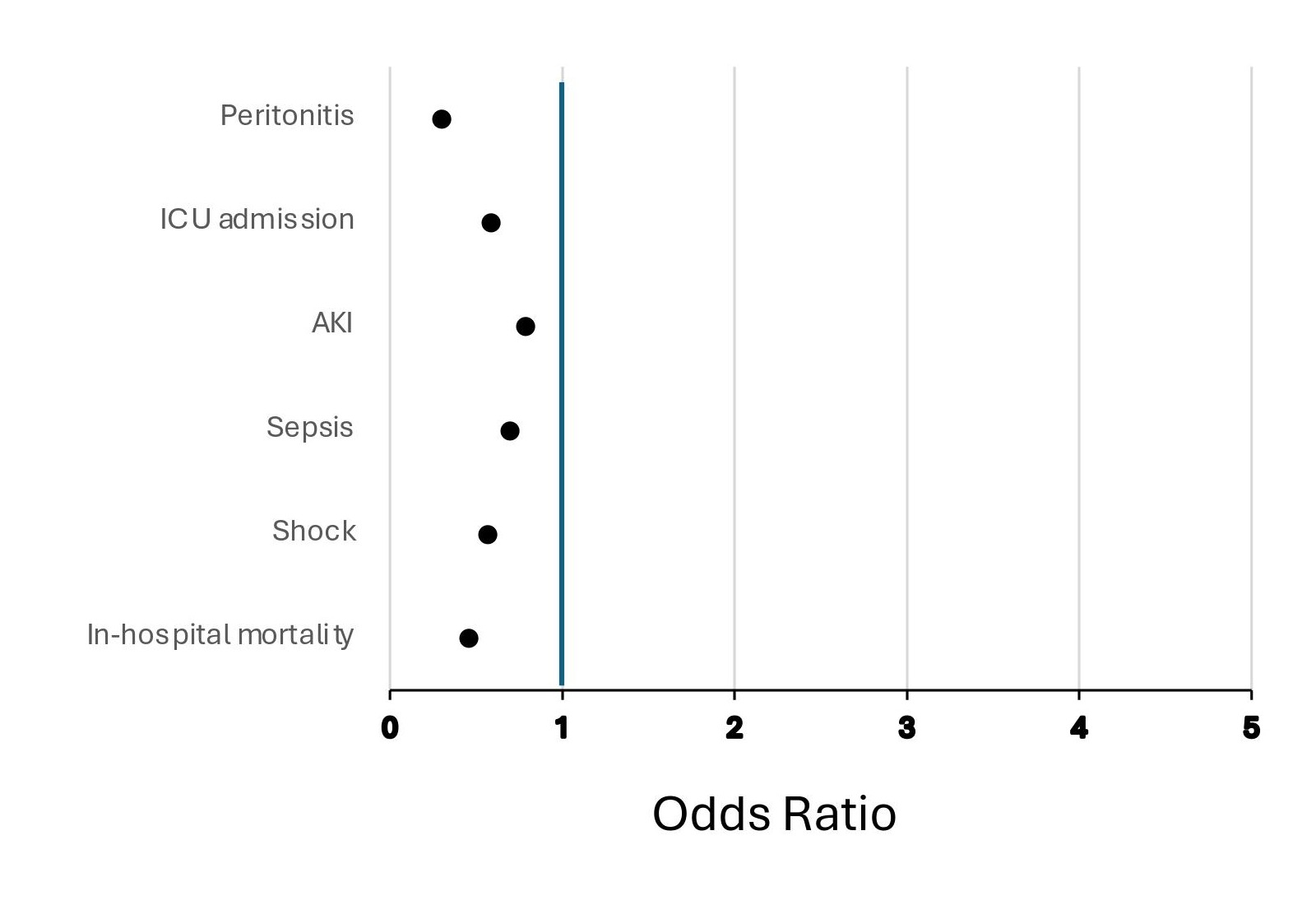Tuesday Poster Session
Category: Liver
P4641 - The Impact of Long-Term Aspirin Use on Outcomes Among Hospitalized Patients With Metabolic Dysfunction-Associated Steatotic Liver Disease
Tuesday, October 29, 2024
10:30 AM - 4:00 PM ET
Location: Exhibit Hall E

Has Audio

Muhamad Oum, MD
Saint Agnes Medical Center
Fresno, CA
Presenting Author(s)
Muhamad Oum, MD1, Humzah Iqbal, MD2, Rakahn Haddadin, MD3, Jalal Samhoun, MD4, Fatimah Aftab, BS5, Haroon Iqbal, BS6, Hasib Haidary, BS7, Yahya Alsawaf, MD8, Mhd Kutaiba Albuni, MD9, Bisher Sawaf, MD10, Sommer Sekhon, BS11, Sammy Saab, MD, MPH12
1Saint Agnes Medical Center, Fresno, CA; 2University of California San Francisco, Fresno, CA; 3MountainView Hospital, Las Vegas, NV; 4Florida Atlantic University, Wellington, FL; 5University of Toledo College Medicine and Life Sciences, Toledo, OH; 6St. George's University, Irvine, CA; 7American University of Antigua, Irvine, CA; 8MedStar Health, Towson, MD; 9TriHealth, Doha, Ad Dawhah, Qatar; 10University of Toledo Health Sciences Campus, Toledo, OH; 11Smittcamp Family Honors College, CSU Fresno, Fresno, CA; 12Pfleger Liver Institute, UCLA Medical Center, Los Angeles, CA
Introduction: Metabolic dysfunction–associated steatotic liver disease (MASLD) is the leading cause of chronic liver disease in Western countries, affecting over 30% of US adults. This condition is often progressive, with up to one-third of patients developing steatohepatitis and fibrosis, potentially leading to cirrhosis, hepatocellular carcinoma, and ultimately, mortality. Recent studies have highlighted that aspirin reduces hepatic fat content, suggesting a preventive role against the progression of fibrosis and liver cancer. Inspired by these findings, we examined data from the Nationwide Inpatient Sample (NIS) 2020 to assess the impact of long-term aspirin use on clinical outcomes in MASLD patients.
Methods: Patients with MASLD based on International Classification of Diseases-10th Revision (ICD-10) codes were identified using the Nationwide Inpatient Sample (NIS) 2020. Patients were stratified based on long-term aspirin use. Outcomes assessed included in-hospital mortality, shock, sepsis, acute kidney injury (AKI), intensive care unit (ICU) admission, peritonitis, length of stay (LOS), and total hospitalization charges. The relationship between variables of interest and outcomes was assessed using multivariate logistic regression after adjusting for confounding factors.
Results: A total of 463,999 MASLD patients were included in the final analysis. Of these, 54,288 patients (11.7%) were on long-term aspirin use. On multivariate regression analysis, long-term aspirin use was associated with decreased odds of in-hospital mortality (aOR 0.46, P < 0.001), shock (aOR 0.57, P < 0.001), sepsis (aOR 0.70, P < 0.001), AKI (aOR 0.79, P < 0.001), ICU admission (aOR 0.59, P < 0.001), and peritonitis (aOR 0.3, P < 0.001). Long-term aspirin use was also associated with shorter LOS (4.7 days vs. 5.3 days) and lower total hospitalization charges ($58,924 vs. $72,850).
Discussion: In our study, 11.7% of MASLD patients were on long-term aspirin use. We found that long-term aspirin use was associated with decreased odds of in-hospital mortality, shock, sepsis, AKI, ICU admission, and peritonitis. Additionally, patients on long-term aspirin use had shorter LOS and lower total hospitalization charges. MASLD patients might benefit from long-term aspirin use, as recent studies have shown that it also lowers fat content and might slow the progression to cirrhosis and cancer.

Disclosures:
Muhamad Oum, MD1, Humzah Iqbal, MD2, Rakahn Haddadin, MD3, Jalal Samhoun, MD4, Fatimah Aftab, BS5, Haroon Iqbal, BS6, Hasib Haidary, BS7, Yahya Alsawaf, MD8, Mhd Kutaiba Albuni, MD9, Bisher Sawaf, MD10, Sommer Sekhon, BS11, Sammy Saab, MD, MPH12. P4641 - The Impact of Long-Term Aspirin Use on Outcomes Among Hospitalized Patients With Metabolic Dysfunction-Associated Steatotic Liver Disease, ACG 2024 Annual Scientific Meeting Abstracts. Philadelphia, PA: American College of Gastroenterology.
1Saint Agnes Medical Center, Fresno, CA; 2University of California San Francisco, Fresno, CA; 3MountainView Hospital, Las Vegas, NV; 4Florida Atlantic University, Wellington, FL; 5University of Toledo College Medicine and Life Sciences, Toledo, OH; 6St. George's University, Irvine, CA; 7American University of Antigua, Irvine, CA; 8MedStar Health, Towson, MD; 9TriHealth, Doha, Ad Dawhah, Qatar; 10University of Toledo Health Sciences Campus, Toledo, OH; 11Smittcamp Family Honors College, CSU Fresno, Fresno, CA; 12Pfleger Liver Institute, UCLA Medical Center, Los Angeles, CA
Introduction: Metabolic dysfunction–associated steatotic liver disease (MASLD) is the leading cause of chronic liver disease in Western countries, affecting over 30% of US adults. This condition is often progressive, with up to one-third of patients developing steatohepatitis and fibrosis, potentially leading to cirrhosis, hepatocellular carcinoma, and ultimately, mortality. Recent studies have highlighted that aspirin reduces hepatic fat content, suggesting a preventive role against the progression of fibrosis and liver cancer. Inspired by these findings, we examined data from the Nationwide Inpatient Sample (NIS) 2020 to assess the impact of long-term aspirin use on clinical outcomes in MASLD patients.
Methods: Patients with MASLD based on International Classification of Diseases-10th Revision (ICD-10) codes were identified using the Nationwide Inpatient Sample (NIS) 2020. Patients were stratified based on long-term aspirin use. Outcomes assessed included in-hospital mortality, shock, sepsis, acute kidney injury (AKI), intensive care unit (ICU) admission, peritonitis, length of stay (LOS), and total hospitalization charges. The relationship between variables of interest and outcomes was assessed using multivariate logistic regression after adjusting for confounding factors.
Results: A total of 463,999 MASLD patients were included in the final analysis. Of these, 54,288 patients (11.7%) were on long-term aspirin use. On multivariate regression analysis, long-term aspirin use was associated with decreased odds of in-hospital mortality (aOR 0.46, P < 0.001), shock (aOR 0.57, P < 0.001), sepsis (aOR 0.70, P < 0.001), AKI (aOR 0.79, P < 0.001), ICU admission (aOR 0.59, P < 0.001), and peritonitis (aOR 0.3, P < 0.001). Long-term aspirin use was also associated with shorter LOS (4.7 days vs. 5.3 days) and lower total hospitalization charges ($58,924 vs. $72,850).
Discussion: In our study, 11.7% of MASLD patients were on long-term aspirin use. We found that long-term aspirin use was associated with decreased odds of in-hospital mortality, shock, sepsis, AKI, ICU admission, and peritonitis. Additionally, patients on long-term aspirin use had shorter LOS and lower total hospitalization charges. MASLD patients might benefit from long-term aspirin use, as recent studies have shown that it also lowers fat content and might slow the progression to cirrhosis and cancer.

Figure: Outcomes displayed by odds ratio
Disclosures:
Muhamad Oum indicated no relevant financial relationships.
Humzah Iqbal indicated no relevant financial relationships.
Rakahn Haddadin indicated no relevant financial relationships.
Jalal Samhoun indicated no relevant financial relationships.
Fatimah Aftab indicated no relevant financial relationships.
Haroon Iqbal indicated no relevant financial relationships.
Hasib Haidary indicated no relevant financial relationships.
Yahya Alsawaf indicated no relevant financial relationships.
Mhd Kutaiba Albuni indicated no relevant financial relationships.
Bisher Sawaf indicated no relevant financial relationships.
Sommer Sekhon indicated no relevant financial relationships.
Sammy Saab indicated no relevant financial relationships.
Muhamad Oum, MD1, Humzah Iqbal, MD2, Rakahn Haddadin, MD3, Jalal Samhoun, MD4, Fatimah Aftab, BS5, Haroon Iqbal, BS6, Hasib Haidary, BS7, Yahya Alsawaf, MD8, Mhd Kutaiba Albuni, MD9, Bisher Sawaf, MD10, Sommer Sekhon, BS11, Sammy Saab, MD, MPH12. P4641 - The Impact of Long-Term Aspirin Use on Outcomes Among Hospitalized Patients With Metabolic Dysfunction-Associated Steatotic Liver Disease, ACG 2024 Annual Scientific Meeting Abstracts. Philadelphia, PA: American College of Gastroenterology.
